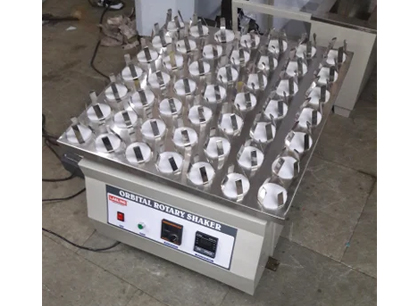-
Call
+ 91 9869569782 / 9594079782
-
Email
Clean Room Equipment
Clean Room Equipment Manufacturer, Supplier

Clean rooms are controlled environments with low levels of particulate and microbial contamination, used in various industries such as pharmaceuticals, biotechnology, electronics, aerospace, and more. The maintenance of a clean room's stringent cleanliness standards is crucial for ensuring the quality and reliability of products produced within it. Clean room equipment plays a vital role in achieving and maintaining the desired cleanliness levels. In this article, we will explore the importance and different types of clean room equipment used in various industries.
Importance of Clean Room Equipment
Clean room equipment is specifically designed to minimize the introduction and generation of contaminants within the controlled environment. The significance of this equipment lies in:
- Contamination Control: Clean room equipment ensures that the number of particles and microorganisms in the air and on surfaces is within acceptable limits, preventing any potential product contamination.
- Product Quality: Industries such as pharmaceuticals and biotechnology require sterile and contaminant-free environments to maintain the highest product quality and safety standards.
- Worker Safety: Clean room equipment not only protects the products but also safeguards the personnel working within the clean room from hazardous substances and contamination.
- Regulatory Compliance: Many industries must comply with strict regulatory guidelines regarding cleanliness, and appropriate clean room equipment is vital to meet those standards.
Types of Clean Room Equipment :
- High-Efficiency Particulate Air (HEPA) Filters: HEPA filters are a fundamental component of clean room equipment. They are designed to trap particles as small as 0.3 microns with high efficiency, ensuring the air circulating in the clean room is purified.
- Air Showers: Air showers are chambers that personnel must pass through before entering the clean room. They blow high-velocity, filtered air onto the person, removing loose contaminants from their clothing and body
- Pass-Through Chambers: Also known as airlocks, pass-through chambers allow the transfer of materials in and out of the clean room without contaminating its environment. They come with interlocking doors to maintain pressure differentials.
- Laminar Flow Cabinets: These cabinets provide a continuous flow of filtered air in a unidirectional pattern, creating an ultra-clean workspace for tasks that require a sterile environment.
- Gloveboxes and Isolators: Gloveboxes and isolators create an enclosed, controlled environment to handle sensitive materials. They protect both the materials being manipulated and the clean room from potential contamination.
- Clean Room Garments: Clean room personnel wear specialized garments like coveralls, hoods, gloves, and shoe covers to prevent human-generated contamination
- Air Filtration Units: These standalone filtration systems are used in smaller clean room environments or as supplementary equipment to ensure the air quality remains high.
- Environmental Monitoring Systems: These systems continuously monitor the clean room's air quality, temperature, humidity, and pressure differentials, alerting operators to any deviations that may affect the controlled environment.
Benefits :
- Product Quality Assurance: Clean room equipment helps maintain a controlled environment with minimal particulate and microbial contamination. This ensures the production of high-quality, reliable, and consistent products, especially in industries like pharmaceuticals, biotechnology, and electronics.
- Regulatory Compliance: Many industries are subject to stringent regulatory guidelines regarding cleanliness and contamination control. Clean room equipment ensures compliance with these standards, avoiding costly fines and product recalls.
- Contamination Control: Clean room equipment, such as HEPA filters and air showers, effectively removes and prevents contaminants from entering the clean room. This helps prevent cross-contamination between products and materials.
- Worker Safety: Clean room equipment not only protects the products but also safeguards the health and safety of personnel working in the clean room. It reduces their exposure to harmful substances and potential allergens.
- Increased Efficiency: Clean room equipment, like laminar flow cabinets and isolators, provides a controlled and organized workspace, improving productivity and reducing errors during critical tasks
- Extended Product Shelf Life: Industries dealing with sensitive products, such as pharmaceuticals and certain electronic components, can extend the shelf life of their products by producing and storing them in a contamination-free environment.
- Reduced Rework and Waste: The stringent contamination control provided by clean room equipment reduces the need for product rework, leading to less material waste and increased cost-effectiveness.
- Critical Research and Development: Clean rooms equipped with specialized equipment enable researchers and scientists to work on cutting-edge projects in nanotechnology, biotechnology,and other advanced fields that require contamination-free environments.
Applications:
- Pharmaceutical Industry: Clean room equipment is extensively used in pharmaceutical manufacturing, especially for the production of injectable drugs, vaccines, and sterile medical devices.
- Biotechnology: Biotech companies rely on clean rooms and specialized clean room equipment for research, development, and production of biopharmaceuticals and genetically engineered products.
- Electronics and Semiconductors: Clean rooms with advanced equipment are crucial for semiconductor fabrication, microelectronics, and the assembly of electronic components to prevent defects caused by contaminants.
- Aerospace and Defense: Industries involved in aerospace and defense applications use clean room facilities for assembling and testing sensitive components used in satellites, rockets, and military equipment.
- Medical Device Manufacturing: Clean rooms are employed in the production of medical devices such as implantable devices, surgical tools, and diagnostic equipment to ensure patient safety
- Optics and Photonics: Clean rooms are essential for manufacturing optical components, lasers, and precision instruments, where even minor particulate contamination can significantly impact performance.
- Food and Beverage: In food and beverage processing, clean room equipment is utilized for sterile packaging, aseptic filling, and controlled environments for research and development.
- Nanotechnology: Nanotechnology research often requires ultra-clean environments to prevent interference from contaminants during the creation of nanomaterials and nanostructures.
Whether it's the pharmaceutical, biotechnology, electronics, aerospace, or other industries, Aditi Associates' clean room equipment has been trusted to provide contamination-free environments, safeguarding product integrity and worker safety. As technology continues to evolve, Aditi Associates remains at the forefront, offering cutting-edge clean room solutions that meet the ever-growing demands of the global market.
Request A Quote